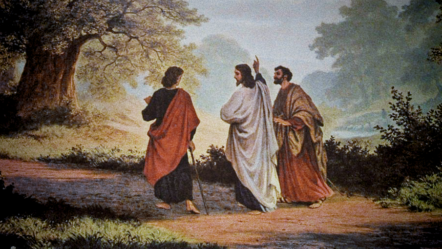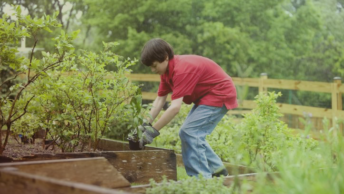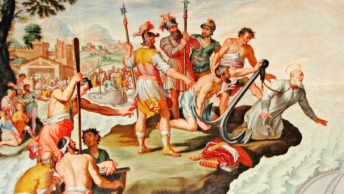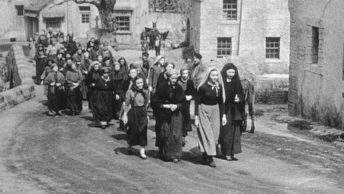The Fourth Sunday of Easter is also the World Day of Prayer for Vocations, and so I’ve asked our fourth grade students from school to share what occupation or career they’d like to have when they grow up. Quite a few are interested in being professional athletes. Ryan, for instance, would like to be a pro soccer player, and three of his classmates—Frank, Declan, and Samantha—hope to be professional basketball players. (I’m guessing that, at least in Samantha’s case, it may have been a case of the Caitlyn Clark effect.) Lucas wants to be a famous baseball player, and Finn desires to be famous as a football player. Andrew also mentioned professional football, but he was a bit more precise: he wants to be a wide receiver for the Detroit Lions. (He also promises that if he makes a lot of money this way, he’ll donate much of it to the poor.) Vera—who was baptized, confirmed, and made First Communion at the Easter Vigil a few weeks ago—would like to be a gymnast, as she’s enjoyed gymnastics during the three years she’s been doing them. Christian mentioned something I never would have guessed: he wants to open a shop that sells yo-yos, while also becoming the world yo-yo champion for maybe seven straight years.
Another budding entrepreneur is Jacob, who wants to start his own shoe company called X Shot and create gold-colored shoes for people to buy. Ryker mentioned that his dad operates an auto repair shop, the Auto Doctor, and so he wants to go into the family business. Ian has a more scientific goal, saying, “I want to become a geologist because I’m so interested in rocks and minerals, [and] I know so much about geology it’s not funny.” Jasmine also wants to be a scientist so as to help discover new species—unless she becomes an astronaut; that would be fun because she’d be able to eat freeze-dried snacks up in outer space. Daniel would like to be an archaeologist, because, he says, it looks like fun. Caroline, being an animal lover, wants to open her own shelter called the “Cat Café,” where she’ll help homeless kittens—feeding them, nursing them back to health, and putting them up for adoption. Russell wants to be a famous chef, and plans on cooking for the poor and for orphans. Julianna desires to be a teacher because it would be fun to teach kids—as long as they’re in first grade or kindergarten. There are two girls in the class named Sophia. One of them wants to be a doctor, because it would be interesting to help and care for people. The other Sophia hopes to be a successful lawyer, with a focus on commercial law, since that would involve meeting celebrities like Johnny Depp. She thinks she’s qualified because, as she writes, “I have always fought back and never given up from finding evidence to convince people that I am right.”
This is certainly a wide and interesting range of possibilities, and all of them can be acceptable to God—for they could all involve opportunities to bear witness to the truth of the Gospel, and help and influence other people through a personal example of integrity and compassion. No matter what our occupation or status in life—student, employer, employee, business owner, unemployed or disabled, homemaker, or retiree—the Lord calls us to be His witnesses in the world, to pray for the success of the Church’s missionary activities, and to do our part in preparing for the coming of His Kingdom.
Each year on the Fourth Sunday of Easter, Jesus speaks of Himself in the Gospel (John 10:11-18) as the Good Shepherd—the One Who loves His flock so much that He lays down His life on their behalf. This sort of freely-chosen divine sacrifice is truly wonderful and amazing—and that’s why, as St. Peter (Acts 4:8-12) says, “There is no salvation through anyone else, nor is there any other name under Heaven given to the human race by which we are to be saved.” Jesus alone is the Savior of the world, and through baptism—a sacrament He entrusted to His Church—we become part of the family of God. As St. John (1 John 3:1-2) says, this is another sign of God’s love. Unfortunately, as the Reading points out, even today—2000 years after the coming of Christ—many people still do not know of God. Either, through no fault of their own, they’ve never heard of Him or been exposed to the Gospel, or they’ve allowed the false values and priorities of this world to silence their consciences and tempt or seduce them into thinking only of themselves and their desires—in effect living as if God doesn’t exist. Such a worldly lifestyle is a spiritual dead-end, and potentially an everlasting disaster; that’s why Jesus wants all Christians, regardless of their particular vocations, to help save souls by sharing His good news through their words and example.
Do you remember, back in fourth grade, what you wanted to be when you grew up? If so, how did things turn out? If you had the chance to live your life over again, would you do things differently? Those are interesting questions to ponder; however, a much more important question is this: are we living in a way right now that gives glory to God and helps make this world a better place? If we’re living only for ourselves, not talking about Jesus with others when we have the chance, and not truly centering our lives around Him, the answer is probably no—and we may even be in danger of wandering away from Christ’s flock, following the false shepherds of this world, and losing our salvation. If instead we’re graciously influencing others by our words and example, encouraging people to discover and pursue their calling from God, and otherwise putting our faith into practice, then it’s reasonable to believe that Jesus is pleased with us, and will guard us from evil and lead us to safe pasture.
It’s always a waste, and sometimes even a tragedy, when people choose to live as hired hands who are only in it for the money or for personal gain. So many people today are making this choice, whether deliberately or by default. Jesus instead invites us to follow His example by manifesting a genuine concern for our brothers and sisters, and especially for those who do not yet know Him. The Church certainly needs many more priests, deacons, and religious—that’s why we constantly pray for this crucially important intention—but every vocation can provide opportunities to share our faith and to be salt and light for the world. Let us ask the Holy Spirit to guide and direct us in this matter, even as we pray that all members of the Church—especially our young people—will hear and answer the Lord’s call.








